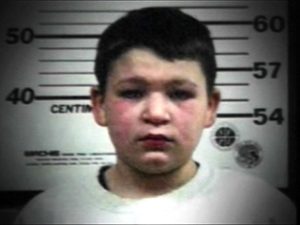Last year, then eleven years old, Jordan Brown was blamed for the deaths of his father’s pregnant fiancée and an unborn fetus while she was lying in bed. Now, the twelve year old will be tried in an adult court for criminal homicide, Judge Dominick Motto decided on Monday, Mar. 29. He was reported as saying, “This offense was an execution-style killing of a defenseless pregnant young mother. A more horrific crime is difficult to imagine.”

Brown could be convicted of anything from involuntary manslaughter to first degree murder under Pennsylvania law for using a shotgun and killing twenty-six year old Kenzie Marie Houk and the unborn male fetus. The eight month old fetus died as a result of a lack of oxygen. The murder occurred on Feb. 20, 2009 in the family’s farmhouse in New Galilee, a small town in western Pennsylvania.
Prosecutors have decided to go after a conviction of first degree murder, which could lead Brown to spend the rest of his life in prison. President of the National Association of Criminal Defense Attorneys, Cynthia Orr, commented that she has never encountered someone as young as Brown being indicted with fetal homicide. Prosecutors have theorized that Brown was jealous of the unborn child and Houk, and police have come to the conclusion that he hid his youth-model 20-gauge shotgun with a blanket as he walked into the bedroom. Later, it was discovered that Brown threw the shell casing on a trail on the way to the school bus.
Brown’s defense lawyers have contested that the case would be handled best in juvenile court. That way, he could be able to obtain treatment and imprisonment designed specifically for young offenders. The attorneys had to convince Judge Motto that Brown would respond better to therapy in a juvenile center rather than being tried as an adult. The judge dismissed the claim, saying that the evidence presented by the defense psychologist, Kirk Heilbrun, was not convincing enough. Heilbrun claimed that Brown was a low-risk offender but Motto focused on the prosecution’s discovery: that Brown minimized the crime, tried to pass the blame, and even at one point, denied it altogether.
Houk’s mother questioned why there would be debate. “There was no reason for uncertainty in our eyes. We’re pleased.”







